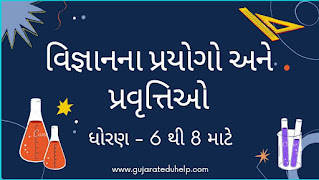Science activities and experiments for Std 6 to 8
An experiment is a procedure that is carried out to support, refute, or validate a hypothesis. Experiments provide information on cause and effect by demonstrating what result occurs when a particular factor is manipulated. Experiments vary greatly in purpose and scale, but are always based on a repeatable procedure and logical analysis of the results.
There are also natural experimental studies. A child may perform basic experiments to understand gravity, while teams of scientists may need years of systematic investigation to advance their understanding of a phenomenon.
Std 6 To 8 Science Experiments pdf file
Experiments and other types of hands-on activities are very important to student learning in the science classroom. Experiments can increase test scores and help a student become more engaged and interested in the material she is learning, especially when it is used over time.
Experiments can range from personal and informal natural comparisons (for example, tasting a variety of chocolates to find a favorite), to highly controlled (for example, tests requiring complex apparatus supervised by many scientists hoping to discover information about subatomic particles ). The uses of experiments vary considerably between the natural and human sciences.
Std 6 To 8 Science Activities pdf file
Experiments typically include controls, which are designed to minimize the effects of variables other than the single independent variable. This increases the reliability of the results, often through a comparison between the control measurements and the other measurements. Scientific controls are part of the scientific method.
blank scince day certificate pdf
Ideally, all the variables in an experiment are controlled (taken into account by the control measures) and none are uncontrolled. In such an experiment, if all the controls work as expected, it is possible to conclude that the experiment works as expected and that the results are due to the effect of the tested variable. In the scientific method, an experiment is an empirical procedure that arbitrates competing models or hypotheses. Researchers also use experimentation to test existing theories or new hypotheses to support or refute them.
Dhoran 6 To 8 Vigyan Prayog-Pravrutti
An experiment generally tests a hypothesis, which is an expectation about how a particular process or phenomenon works. However, an experiment may also aim to answer a "what if" question, without a specific expectation about what the experiment reveals, or to confirm previous results. If an experiment is done carefully, the results generally support or disprove the hypothesis.
You May Like: E-Learning Videos
According to some philosophies of science, an experiment can never "test" a hypothesis, it can only add support. On the other hand, an experiment that provides a counterexample may disprove a theory or hypothesis, but a theory can always be salvaged by appropriate ad hoc modifications at the expense of simplicity. An experiment must also control for potential confounders - any factor that could spoil the precision or repeatability of the experiment or the ability to interpret the results. Confusion is commonly removed by scientific controls and / or, in randomized experiments, by random assignment.
In engineering and physical sciences, experiments are a major component of the scientific method. They are used to test theories and hypotheses about how physical processes work under particular conditions (for example, whether a particular engineering process can produce a desired chemical compound). Typically, experiments in these fields focus on replicating identical procedures in the hope of producing identical results at each replication. Random assignment is rare.
ધોરણ 6 થી 8 ના વિજ્ઞાનના તમામ વિડીયો નિહાળો.
In medicine and the social sciences, the prevalence of experimental research varies widely between disciplines. However, when used, experiments usually follow the form of the clinical trial, where experimental units (usually individual humans) are randomly assigned to a treatment or control condition where one or more outcomes are evaluated.
In contrast to the norms of the physical sciences, the focus is usually on the average treatment effect (the difference in results between the treatment and control groups) or other test statistic produced by the experiment. Usually a single study does not involve replicates of the experiment, but separate studies can be added through a systematic review and meta-analysis.
વિજ્ઞાન ગણિત શિક્ષકો માટે ટીચર્સ ક્લબની રચના બાબત
There are several differences in experimental practice in each of the branches of science. For example, agricultural research often uses randomized experiments (for example, to test the comparative effectiveness of different fertilizers), while experimental economics often involves experimental testing of theorized human behaviors without relying on the random assignment of individuals to conditions. treatment and control.
Here are some fantastic science experiment for Students
IMPORTANT LINKS:
વિજ્ઞાનના પ્રયોગો અને પ્રવૃત્તિઓ (ધો- 6 to 8)






